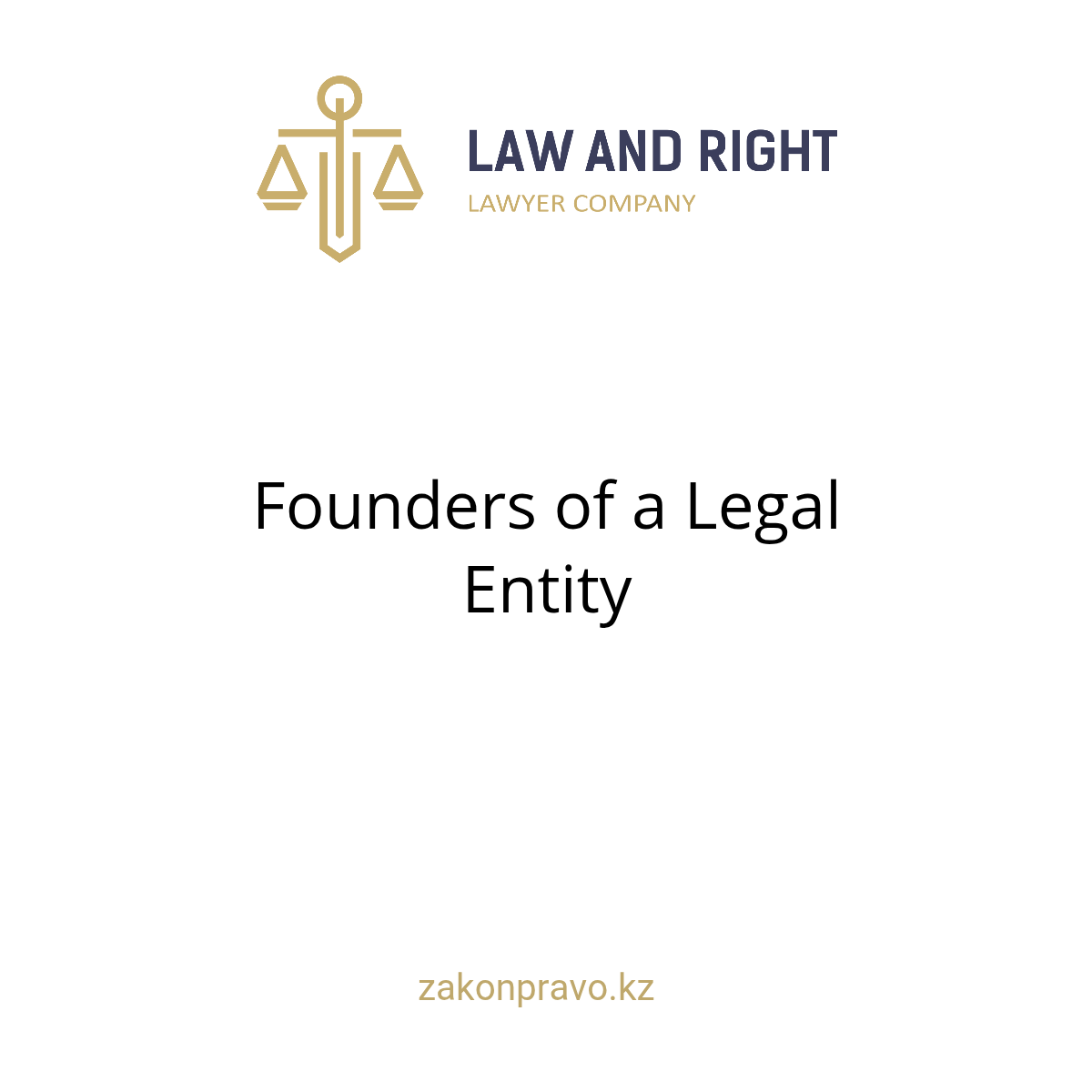Founders of a Legal Entity
📘 1. General Overview of the Article
Founders of a legal entity are individuals or legal entities who initiate the creation of an organization and contribute to its establishment. They determine:
- the legal form of the entity,
- its goals and objectives,
- the structure of management bodies,
- charter capital and other basic parameters.
🔹 Article 40 of the Civil Code of the Republic of Kazakhstan (CC RK) regulates:
- who can be a founder,
- the procedure for establishment,
- restrictions and equality between founders and subsequent participants.
👥 2. Number of Founders (Part 1)
"A legal entity may be founded by one or several founders."
🔹 In Kazakhstan, both sole and joint establishment of a legal entity are allowed.
Examples:
| Legal Form | Number of Founders |
|---|---|
| LLP | From 1 to 50 (more than 50 — must convert to JSC) |
| JSC | Minimum 1, no upper limit |
| Consumer Cooperative | Minimum 3 members |
| Foundation | At least 1 founder |
📌 A sole founder may be either an individual or a legal entity.
⚖️ 3. Who Can Be a Founder? (Part 2)
"...owners of property or authorized bodies or persons..."
🔹 Eligible entities include:
- individuals (citizens of Kazakhstan, foreigners, stateless persons);
- legal entities (commercial, non-commercial, foreign);
- the state represented by an authorized body (e.g., when establishing a state enterprise or institution).
🔹 Allowances and restrictions:
✅ May act as founders:
- state bodies (if expressly authorized);
- state enterprises (with the consent of the owner);
- non-commercial organizations — within the limits of their charter and the law.
❌ May not act as founders:
- entities in the process of liquidation;
- persons prohibited by court decision from engaging in entrepreneurial activity (during the ban);
- legal entities without the owner's consent if operating under the right of economic or operational management.
📌 Important: for example, if an LLP belongs to an akimat and is created under the right of economic management, it may become a founder of a new legal entity only with the akimat’s permission.
📑 4. Equality of Participants (Part 3)
"Founders may not have advantages over other participants... except as provided by law..."
🔹 Essence:
- founders lose their special status after the legal entity is established;
- all participants are equal in rights and obligations, unless otherwise provided by law.
🔹 Exceptions:
- preemptive right to purchase a share (e.g., in LLPs under the Law of the Republic of Kazakhstan "On Partnerships");
- other rights stipulated by special laws or the charter;
- investment projects (e.g., a founder in a startup may be granted more votes — if expressly stated).
📌 Judicial practice is based on the principle of parity among participants unless otherwise provided by law.
🏛️ 5. Related Provisions
| Regulation | Content |
|---|---|
| CC RK, Articles 33–36 | General provisions on legal entities, their legal capacity and structure |
| Law "On LLPs" | Detailed rights and duties of founders and participants |
| Law "On JSCs" | Regulates shareholder status, including initial shareholders |
| Law "On State Property" | Restrictions on establishing legal entities on behalf of the state |
| Law "On Non-Profit Organizations" | Participation of NPOs in establishing other legal entities |
🧾 6. Judicial Practice Examples
🔹 Example 1: Astana, 2021A JSC established under the right of operational management acted as a founder of a new LLP without the consent of the State Property Committee. 📜 The court declared the founding invalid due to the absence of owner consent.
🔹 Example 2: Almaty, 2022An LLP founder attempted to secure in the charter a preferential right to profit distribution. 📜 The court invalidated this clause, citing a violation of the equality principle (Part 3 of Article 40 CC RK).
🌍 7. International Practice
✅ Civil Codes of CIS countries (Russia, Belarus, Kyrgyzstan) also:
- allow establishment by one or several persons;
- require the owner’s consent if property is under management rights;
- prohibit privileges for founders not provided by law.
✅ UNIDROIT Principles:
- emphasize the inadmissibility of privileges that contradict investor and participant equality.
✅ 8. Conclusion
Article 40 of the CC RK:
- defines the range of persons eligible to establish legal entities;
- sets the legal framework for founders' participation;
- ensures the principle of equality among participants, excluding manipulation of ownership structures through special privileges.
🔹 For an existing legal entity, it is crucial to comply with the rules when establishing new organizations — especially if managing state or municipal property.
Attention!
Law and Law Law Law draws your attention to the fact that this document is basic and does not always meet the requirements of a particular situation. Our lawyers are ready to assist you in legal advice, drawing up any legal document suitable for your situation.
For more information, please contact a Lawyer / Attorney by phone: +7 (708) 971-78-58; +7 (700) 978 5755, +7 (700) 978 5085.
Attorney at Law Almaty Lawyer Legal Services Legal Advice Civil Criminal Administrative Cases Disputes Protection Arbitration Law Firm Kazakhstan Law Office Court Cases


